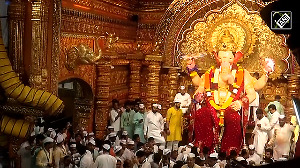Can President Bush push through US Congress the issue of reprocessing fuel and allowing India to have uninterrupted supply of fuel that could be agreed upon under the 123 Agreement?
As Prime Minister Manmohan Singh and his wife Gursharan arrived in Berlin on Wednesday to attend the Group of 8 and Outreach Summit at Germany's Baltic resort of Heiligendamm, his team is groping for the answer to the above question.On June 8, Dr Singh will be meeting President George Bush, which can turn into an important meet if Bush takes the decision to agree to Indian proposals on the contentious issue of reprocessing of used fuel and the uncertainty regarding the supply of imported fuel.
Does Bush still have political clout in Washington to help India get out of the nuclear apartheid by getting favourable votes if and when the 123 agreement between India and US comes up for vote?
As no one in New Delhi can answer this question, the Bush-Dr Singh meeting in Germany will help get some clues.
Dr Singh is accompanied by National Security Advisor M K Narayanan and Foreign Secretary Shiv Shankar Menon.
If one believes the Indian establishment, the Indo-US nuclear deal is at a crucial stage where India has proposed some fresh ideas to avoid any kind of uncertainty in the supply of fuel, crucial for continuation of operations of the nuclear power plants.
It is a known fact that if India agrees for stringent safeguards in perpetuity, then India would want uninterrupted fuel supply.
In the last two negotiations, these ideas moved ahead and US negotiators have not thrown them out of the window.
They have, now, left the issue to the political leadership, meaning President Bush.
It is believed that Bush will have to now weigh if he can convince Congressmen to accept the Indian proposal, and on basis of his assumption the US will conduct further talks on the Indo-US nuclear deal.
The Indo-US bilateral talks on June 8 in Germany gains significance due to the ongoing negotiations on the nuclear deal.
If Bush agrees to take the risk by accepting India's offer, then the fine print of the 123 Agreement will go through American lawyers' and experts' hands before the 123 Agreement is signed and put up before the US Congress.
In essence, the Indian side has almost completed the negotiations by putting all their cards on sensitive issues on the table.
India has shown how far it can go. Also, on the crucial issue of uninterrupted nuclear fuel supply, irrespective of the cause, India has shown a plan which can be accepted by US because it's workable within the existing legal framework of the US.
Importantly, India has also taken the issue of reprocessing in the final stages by offering workable options that can create trust in India's intentions of not using plutonium in making nuclear weapons. India expects to derive plutonium from the spent fuel after reprocessing, provided reprocessing of imported fuel is allowed.
Its now understood that the American side will have to judge the fine print of the last offer discussed with India and calculate if the Congress will also agree to the Indian offer.The Indian side has repeatedly told Nicholas Burns' team that the Indian public is quite edgy about the twin issues.
Dr Singh on Wednesday avoided any press interactions on board Konark, Air India, his flight.
Sanjaya Baru, Dr Singh's press advisor, told the media that the prime minister had a sore throat and was resting after taking antibiotics.
However, the weather in Berlin at present is 25 degree Celcius and should help Dr Singh recover faster. On Thursday, Dr Singh will meet the presidents of Nigeria, China and Mexico. He will also meet United Nations Secretary General Ban ki-Moon.
On Thursday evening, the President of Mexico Felipe Calderon has coordinated a meeting of the leaders of Outreach countries which includes India, China, Mexico, South Africa and Brazil.





